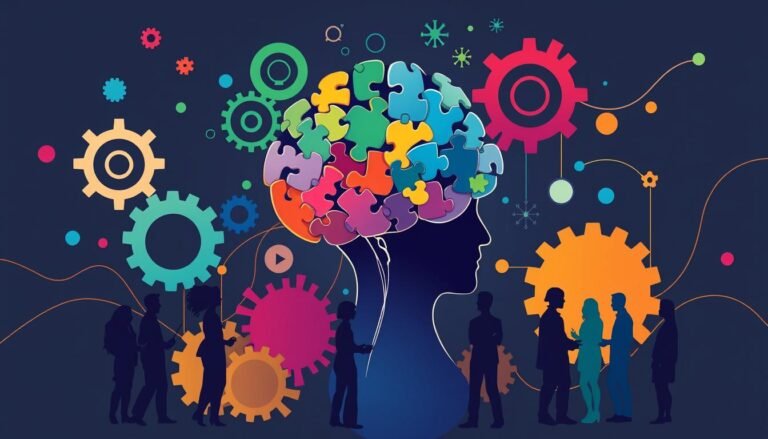Psychological Adaptation Mechanisms
Our minds are incredible tools for dealing with life’s ups and downs. Psychological adaptations help us handle stress, build resilience, and manage our feelings. These strategies have evolved to help us survive and succeed.
Our brains have developed smart ways to adapt to stress and big changes in life. These mechanisms influence how we think, feel, and act. Knowing about these adaptations can help us improve our mental health and happiness.
Managing stress is a big part of psychological adaptation. Our bodies and minds work together to deal with pressure and recover from hard times. This ability to bounce back is key for doing well in today’s fast world.
Key Takeaways
- Psychological adaptations help us cope with life’s challenges
- Coping strategies have evolved to boost survival and success
- Stress management is crucial for mental well-being
- Resilience allows us to bounce back from difficulties
- Understanding adaptations can improve our mental health
Understanding the Foundations of Human Adaptation
Human adaptation is a field that looks into how we adjust to our surroundings. It combines insights from evolutionary psychology and cognitive adaptations. This helps us understand our behaviors and thought processes.
Definition and Core Concepts
Psychological adaptations are traits shaped by evolution to help us reproduce. They include both conscious social strategies and subconscious emotional responses. Defense mechanisms are key in understanding how we deal with stress and keep our minds balanced.
Evolution’s Role in Psychological Development
Evolutionary psychology started in the late 1980s, combining insights from different fields. It shows interesting patterns in human behavior. For example, studies find that men are attracted to women in their peak fertility years. Women often prefer partners who are resourceful.
Darwinian Theory and Modern Psychology
Darwin’s work in the 1870s helped start evolutionary psychology. He suggested that emotions evolved to communicate with others. Today, researchers study how our ancestral environments influence our behaviors.
| Year | Funds Obligated |
|---|---|
| 1991 | $25,000.00 |
| 1992 | $62,500.00 |
| 1993 | $62,500.00 |
| 1994 | $62,500.00 |
| 1995 | $62,500.00 |
| 1996 | $37,500.00 |
This funding trend shows growing interest in evolutionary psychology research. It supports studies that help us understand human adaptation better.
The Science Behind Psychological Adaptation Mechanisms
Psychological adaptation mechanisms are key to human survival and reproduction. Cognitive science shows our brains evolved to face challenges from our ancestors’ times. These adaptations shape our behavior and help us deal with complex social situations.
Evolutionary biology tells us humans are made for small, tight-knit groups. This explains why many feel anxious in big, new places. Our brains are still adjusting to today’s fast changes.
Research in evolutionary psychology shows these adaptations are vital:
- Protection from harm
- Disease avoidance
- Social acceptance
- Status navigation
- Kin and offspring care
These mechanisms helped our ancestors survive and reproduce. Today, they still shape our behavior and choices.
“An evolutionary perspective can provide critical insight into the causes of psychological and behavioral dysfunction.” – Cosmides & Tooby, 1999
Cognitive science sees the brain as a computer shaped by natural selection. This view says our mental processes are specialized, not general. This idea, massive modularity, explains why we’re good at some tasks but not others.
| Adaptation | Function | Example |
|---|---|---|
| Fear response | Protect from harm | Avoiding dangerous animals |
| Disgust sensitivity | Avoid diseases | Staying away from rotten food |
| Social bonding | Maintain group cohesion | Forming close friendships |
Understanding these psychological adaptation mechanisms helps us understand human behavior. It’s useful in personal and work settings. By knowing our evolutionary roots, we can better handle today’s complexities.
Evolutionary Psychology and Adaptive Behaviors
Evolutionary psychology looks at how natural selection shapes our behavior and thinking. It became more popular after “The Adapted Mind” was published in 1992. This view sees our minds as tools evolved to solve problems our ancestors faced.
Natural Selection’s Impact on Human Psychology
Our brains evolved to handle information well, creating circuits for adaptive behaviors. Behaviors like fight-or-flight helped our ancestors survive. Now, these mechanisms affect our actions and feelings in today’s world.
Cognitive Adaptations for Survival
Cognitive adaptations are key for human survival. For example, babies are born with fear responses to threats like snakes and spiders. These reactions help us bond with caregivers and meet our needs. They show how our brains are ready for survival from birth.
Social Learning and Adaptation
Social learning is vital for human adaptation. It lets us learn good behaviors from others without direct experience. This skill helped us adapt to new environments and challenges throughout history. Today, it helps us navigate complex social structures and adapt to changing societal norms.
While evolutionary psychology gives us insights into human behavior, our actions are not just about our past. Cultural influences, personal experiences, and cognitive restructuring also shape our behaviors in the modern world.
Defense Mechanisms in Human Psychology
Defense mechanisms are key to our mental health. They help us deal with stress and keep our emotions safe. Knowing about them can help us manage stress and emotions better.
Primary Defense Strategies
Our minds use different ways to protect us from pain. Denial, repression, and projection are some of these strategies. For instance, denial is when we refuse to see the truth. Projection is when we say others have our bad thoughts.
Unconscious Adaptation Processes
Many defense mechanisms work without us even knowing. They help us handle tough situations without thinking about it. Spotting these patterns can make us more aware of ourselves and help us cope better.
Stress Response Patterns
Our bodies and minds have special ways to handle stress. The fight-or-flight response is one example. It helps us react to threats. Learning to control these responses is important for managing stress.
| Defense Mechanism | Description | Example |
|---|---|---|
| Denial | Refusing to accept reality | Ignoring a health diagnosis |
| Projection | Attributing own feelings to others | Accusing others of being judgmental |
| Rationalization | Justifying unacceptable behavior | Making excuses for poor performance |
Understanding defense mechanisms helps us find better ways to cope. This knowledge lets us handle stress and emotions in tough times.
Social Adaptation and Relationship Dynamics
Social adaptation is key in forming and keeping relationships. It helps us fit into our social world. But, it can also lead to anxiety and trouble in keeping a partner.
Studies show social anxiety helps us get along with others. But, in today’s diverse world, it can hurt us. A study found mood and anxiety disorders often go with substance use, showing how mental health and social life are linked.
Behaviors to keep a partner are part of our survival instincts. These actions, like showing love in public or watching out for rivals, help us succeed in long-term relationships.
“Social adaptation reflects individual and social dimensions of adult functioning, encompassing cognitive, affective, and behavioral aspects to meet environmental demands and expectations.”
Being close to family can give us more support and lower anxiety. This idea fits with the Conservation of Resource Theory. It says having more resources helps us deal with stress and recover from losses. Resources include good relationships and social skills.
- Network sizes for adults 50 years and older include approximately 7 people
- Individuals knew their network members for around 38 years on average
- Recent cohorts of older adults lived closer to and had more frequent contact with their network members
Knowing how social adaptation works helps us. We can learn to better fit in, feel less anxious, and keep strong relationships. This includes keeping a partner happy and secure.
Emotional Regulation as an Adaptive Tool
Emotional regulation is key to adapting to life’s ups and downs. It’s a big part of emotional intelligence. It helps us get along in social situations and feel better overall.
Managing Emotional Responses
It’s important to manage our emotions for good relationships and stress relief. People who control their emotions well usually have better mental health. This means knowing our feelings and choosing how to show or hide them.
Building Emotional Resilience
Being resilient means bouncing back from tough times. It’s linked to being flexible and can get stronger with practice. Mindfulness, changing our thoughts, and being kind to ourselves can help. Studies show resilient people handle life’s tough spots better and stay mentally healthy.
Adaptation in Social Contexts
Our social skills depend on controlling our emotions in social situations. This skill helps us make and keep friends, work well in teams, and deal with complex social situations. By improving our emotional intelligence, we can better understand others, empathize, and respond well in different situations.
“Emotional regulation is not about suppressing feelings, but about understanding and managing them in a way that benefits both ourselves and those around us.”
In today’s complex world, emotional regulation is more important than ever. By improving this skill, we can be more flexible, better at social interactions, and handle modern life’s challenges.
Sexual Selection and Mate Choice Adaptations
Sexual selection is key in shaping what we find attractive in a mate. It has led to different strategies in humans and other species.
There are two main ways mate choice evolves: intrasexual competition and intersexual selection. In intrasexual competition, the same-sex individuals fight for mates. For example, male stags use their antlers to battle for access to females.
Intersexual selection is about being attracted to certain qualities in a mate. This has led to traits that show fertility, health, and genetic fitness. In humans, these traits include physical features and behaviors.
Studies show that what we find attractive varies by sex and culture. For instance:
- Males often try to appear more attractive, like through humor.
- Females usually look for signs of fertility and health, like waist-to-hip ratios.
- Status in groups affects who gets to reproduce, and this changes across cultures.
Our psychological adaptations for choosing mates are not fixed. They change based on our environment and culture. This flexibility helps us find successful mates in different social settings.
| Sex | Common Mate Preferences | Adaptive Strategies |
|---|---|---|
| Male | Youth, physical attractiveness | Resource acquisition, mate retention |
| Female | Status, resources, commitment | Careful mate selection, long-term bonding |
Understanding these adaptations helps us see why we behave in certain ways in relationships. It shows how our evolutionary past influences our choices today.
Modern Environmental Challenges and Adaptation
Our world is changing fast. We face new challenges in cities, at work, and with technology. These changes test our ability to adapt. Let’s explore how we’re coping with these modern pressures.
Digital Age Adaptation
The digital world brings new stresses. We’re always connected, which can be overwhelming. People are finding ways to manage this. Some limit their screen time. Others use apps to help focus. Technological adaptation is key to thriving in this new landscape.
Urban Environment Impacts
Cities shape how we think and feel. Urban psychology studies show that city life can increase stress. But it also offers opportunities. People in cities are learning to create green spaces. They’re building communities in new ways. These efforts help balance the fast pace of urban living.
Workplace Adaptation Strategies
Work is changing too. Many people now work from home. This affects our work-life balance. Companies are trying new approaches. Flexible hours and remote work options are common. Workers are learning to set boundaries between work and personal time.
| Challenge | Adaptation Strategy |
|---|---|
| Digital Overload | Screen time limits, focus apps |
| Urban Stress | Green spaces, community building |
| Work-Life Balance | Flexible hours, remote work |
Adapting to these changes isn’t easy. But humans are resilient. We’re finding new ways to cope with modern life. By understanding these challenges, we can develop better strategies to thrive in our changing world.
Cognitive Restructuring and Mental Flexibility
Cognitive restructuring and mental flexibility are key to psychological resilience. They help us face life’s challenges better. Cognitive therapy, a part of cognitive-behavioral therapy (CBT), boosts these skills.
CBT is a top choice for treating anxiety disorders, lasting 12-16 weeks. It teaches us to think more adaptively through restructuring and experiments. For example, it helps those with panic disorder by changing how they see things and avoid behaviors.
In social anxiety disorder, CBT uses exposure to feared situations. This helps people feel more comfortable in social settings.
Mental flexibility lets us change our thinking as our world changes. It’s vital in today’s fast world. Studies show depression often involves poor cognitive control and flexibility.
Stressful events can also affect these skills. This shows how important it is to develop strong coping strategies.
Improving cognitive restructuring and mental flexibility helps us deal with life’s challenges. These skills not only make us more resilient but also better at solving problems and making decisions. With practice and the right tools, we can all become more adaptable and flexible in our thinking.
Source Links
- Psychological adaptation
- Clinical assessment of psychological adaptive mechanisms in medical settings – PubMed
- Evolutionary Theories in Psychology
- NSF Award Search: Award # 9157449
- Evolutionary psychology | Human Behavior & Adaptation | Britannica
- When Adaptations Go Awry: Functional and Dysfunctional Aspects of Social Anxiety
- Evolutionary Psychology
- Evolutionary Psychology | Internet Encyclopedia of Philosophy
- How Evolutionary Psychology Explains Human Behavior
- Evolutionary psychology
- 20 Defense Mechanisms We Use to Protect Ourselves
- Understanding Defense Mechanisms and Why We Have Them | Relational Psych
- Defense Mechanisms — Seattle Anxiety Specialists – Psychiatry, Psychology, and Psychotherapy
- Social adaptation level and its relationship with the main clinico-dynamic and psychological characteristics in the comorbidity of affective disorders and alcohol dependence | Roshchina | Neurology, Neuropsychiatry, Psychosomatics
- Social Relationships and Adaptation in Later Life
- Frontiers | Cognitive, emotional, and social factors promoting psychosocial adaptation: a study of latent profiles in people living in socially vulnerable contexts
- Digital Technologies for Emotion-Regulation Assessment and Intervention: A Conceptual Review
- Examining Emotion Regulation as an Outcome, Mechanism, or Target of Psychological Treatments
- 3.1: Evolutionary Theories in Psychology
- Sexual Selection | Learn Science at Scitable
- 4.2 Evolutionary Theories in Psychology
- Human adaptation to extreme environmental conditions
- Psychology and Global Climate Change
- Cognitive-Behavioral Treatments for Anxiety and Stress-Related Disorders
- Neuroplasticity in cognitive and psychological mechanisms of depression: An integrative model
- Frontiers | Cognitive Control and Flexibility in the Context of Stress and Depressive Symptoms: The Cognitive Control and Flexibility Questionnaire








